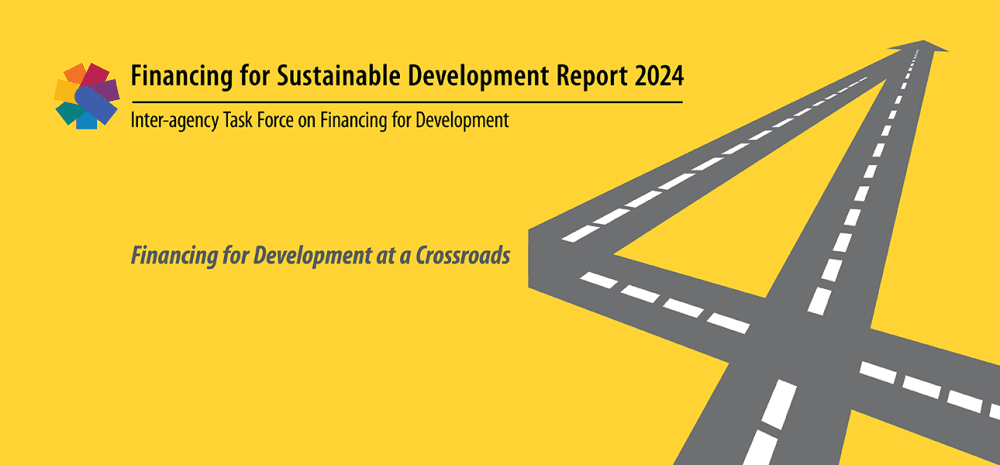The world is facing a sustainable development crisis. The “2024 Financing for Sustainable Development Report: Financing for Development at a Crossroads“ finds that financing challenges are at the heart of the crisis and imperil the SDGs and climate action. The window to rescue the SDGs and prevent a climate catastrophe is still open but closing rapidly.
Financing gaps for sustainable development are large and growing – the estimates by international organizations and others are coalescing around $4 trillion additional investment needed annually for developing countries.
This represents a more than 50% increase over the pre-pandemic estimates. Meanwhile, the finance divide has not been bridged, with developing countries paying around twice as much on average in interest on their total sovereign debt stock as developed countries. Many countries lack access to affordable finance or are in debt distress.
Weak enabling environments are preventing progress. Average global growth has declined, while policy and regulatory frameworks still do not set appropriate incentives. Public budgets and spending is not fully aligned with SDGs. Private investors are not incentivised to invest enough in SDGs and climate action.
The world is at a crossroads. This is the last chance to correct course to achieve the SDGs by the 2030 deadline. Only an urgent, large-scale and sustainable investment push can help achieve the global goals. Next year’s Fourth International Conference on Financing for Development in 2025 will be a once in 80-year opportunity to support coherent transformation of financing. Four actions are needed:
- Close financing gaps for SDG/climate investments (both public and private) at scale and with urgency;
- Close policy and architecture gaps, and reform international institutions;
- Close credibility gaps and trust deficits both international and domestically; and
- Formulate and finance new development pathways.
The role of alcohol taxes according to the new report
The latest version of the Financing for Development Report outlines the important of excise taxes as revenue source for governments to make crucial investments to achieve sustainable development.
Trade taxes had been an important but declining revenue source in developing countries while excise taxes could be used to raise revenue and change consumer behaviour in ways that promote SDG achievement.
14 of 17 SDGs are adversely affected by alcohol. Alcohol is a major obstacle to sustainable development, negatively affecting all three dimensions of sustainability: the social, economic, and environmental dimensions.
https://movendi.ngo/the-issues/the-problem/obstacle-to-development/
The shift in revenue from trade taxes to domestic taxes such as VAT has slowed over the past two decades. At the same time there has been an increase in the use of domestic excise taxes in developing countries for example on fossil fuels, tobacco, alcohol, sugar-sweetened beverages and plastic bags.
The Addis Agenda includes specific recognition of the role of tobacco taxes and now 41 countries have excise and other taxes on tobacco that are more than the World Health Organization (WHO) recommended level of 75 per cent of the retail price.
There is room to increase excise revenues through better design and consistent applications across taxpayers as well as strong potential for using them to help address climate change (see below) and other sustainable development priorities.
The Fourth International Conference on Financing for Development could build on recent country experiences and provide a platform for discussion on how to use excise and other taxes to set incentives that change behaviours.
The role of alcohol taxes according to world class science
Alcohol policy solutions, such as alcohol taxation, are high-impact measures to help achieve multiple SDGs.
For instance, a landmark 2023 study identified 30 cost-effective interventions to achieve the SDGs in the fastest way possible – the urgency that the new Financing for Development Report clearly calls for.
Among these interventions, alcohol policy in general and alcohol taxation in particular have been ranked as the second and third most effective intersectoral policies. Implementing these measures could prevent 150,000 deaths caused by alcohol in the next ten years. For every dollar spent, a country could get back $76 worth of good things happening in society, while alcohol taxation alone can generate benefits worth $53 for every dollar spent.
The potential of alcohol policy to help reach the SDGs
In the peer-reviewed paper, researchers of the Copenhagen Consensus Center examined the benefit-cost analyses of various NCD interventions in low-income (LICs) and lower–middle–income (LMCs) countries. The analyzed 30 interventions recommended by the Disease Control Priorities Project, including six intersectoral policies, such as taxes and 24 clinical services. Using a previously published model to estimate intervention costs and benefits through 2030, researchers found that intersectoral policies often provided great value for money.
They conclude that there are several cost-beneficial opportunities to tackle NCDs in LICs and LMCs. In countries with very limited resources, the best-investment interventions could begin to address the major NCD risk factors, especially tobacco and alcohol, and build greater health system capacity, with benefits continuing to accrue beyond 2030.
Improving alcohol policies could reduce overall alcohol consumption and avert 150,000 deaths over the rest of the decade until 2030.
Each dollar spent on alcohol policy development will deliver $76 of social benefits.
An alcohol tax increase alone can generate large, if slightly lower, benefits at $53 back on the dollar.

